Guide to Playing Real Money Poker Games
Poker offers a thrilling mix of skill, nerve and luck that has inspired a global following totalling hundreds of millions and lets you win big.
Knowing where to start in a game that has dozens of variations can be daunting. Our straightforward guide will ensure you get the very best online poker experience every time.





Poker Basics
The basics of poker are to make ‘hands’ from five random cards dealt to the player; these are certain combinations of cards that are ranked so that players can beat each other with a better hand. Players bet on their hand being stronger than that of their opponents.
To begin, players must make a forced bet called a ‘blind’ or ‘ante’. Then, moving clockwise, players must either call the last bet, raise it, or fold. Calling matches the amount, raising increases it to a new maximum and folding essentially gives up on this round, losing any bet money so far. If all but one player folds, the remaining player wins by default. If not, the remaining players reveal their hands and compare to see who wins.
Poker games vary in rules and setup, but a large number of online games use Texas Hold ‘Em rules. In this version, each player gets two cards instead of five, but there are five other cards held in common by all players, dealt to the middle of the table. From these, each player can make a hand of five.
Poker games on online casinos can also take the form of a one-on-one setup, where the player competes with a dealer, instead of playing ‘live’ with a series of other players. This works more akin to a video poker game, without a bluffing mechanic; the player simply bets on the strength of their cards.

How to Play Slots Like an Expert
Stick to these simple principles and you will be playing poker like a pro in no time:
When to Bluff
Knowing when to bluff yourself typically comes down to knowing the hands. So long as you can immediately spot a strong hand and have a good idea of how it ranks (how many other hands might potentially beat it, for example) then you can make a decision quickly. Most of the time, you’ll have a fairly common low hand and will have to judge how safe it is to bet on it.
Know Your Next Move
Part of poker is judging the likelihood of what will come next. For example, you may be dealt a low pair, such as two 2s. This isn’t much, but if another pair appears in the community cards, suddenly you have two pair. If a third 2 appears in the community cards, you have three of a kind. Of course, your opponents may have the same. If the community cards have four sequential cards but you don’t have the missing number to make a straight, odds are someone else does. Of course, they don’t know that you don’t have the missing number; this is where bluffing comes in.
Know When to Fold
Don’t be afraid to fold, this is especially true of a weak starting hand; if you don’t want to risk it, then don’t. Save the bets for the next round.
Poker Rules
Poker has varied origin stories, disputed by historians. Some believe it came from a Persian game called ‘As-Nas’, while others cite a similar French game called ‘poque’.
This word comes from the German ‘pochen’, to brag or bluff, which seems fitting. Poker however is also considered to share ancestry with the Italian game ‘primero’ and French game ‘brelan’, which itself became ‘brag’ in England. Those who focus on the betting system of poker, which is more unique, point to true origins in the Mississippi River region in the 1800s.
Poker as we know it became hugely popular in the 1970s, spawning both tournaments and strategy books. The game entered common usage as a recreational pastime. Another big boom came after flop games were legalised in California in 1987. Poker soon became a staple part of casinos and spread wherever they did.
The arrival of online technology created another boom, as it became possible for players around the world to connect and compete. The game could be followed on television or played on a home computer. Free games could be played in the 1990s over platforms like IRC Poker, then real money pokey appeared in 1998 with Planet Poker. There are now many online poker sites, with a survey in 2010 approximating 545 around the world.

Poker Strategies
A big part of improving your odds in poker is knowing the hands. When you can immediately spot a strong hand and know that you should be calling or raising, then you’re in a good position.
If you need to stop and think, it can reveal uncertainty to other players, or simply cause you to make mistakes. Knowing which hands are likely to pay out and which are a lost cause is also important, as tactical folding is a useful tool for conversing your funds.
Be willing to adjust your strategy as you play, especially against other players, so that your patterns do not become clear. Be aware of what your opponents can make from the community cards too and how your potential hand stacks up.
As important as folding can be, it’s also important to be brave now and then and play a little further along, to see what happens. You can’t hold out for a top hand like a pair of aces, as the odds of a top starting hand are around 2.1%.
Should you have a flush draw after the flop, being one card short of a full flush, then you have a 34.97% chance to make that full flush. This is well worth knowing to make that judgement easier.

Types of Poker
There are four broad families of poker which have led onto the creation of myriad other games. Typically, all these use the same hand rankings and a similar pattern, but with tweaks to the rules.
Straight poker is the standard way of playing, where each player gets a full hand to start with, typically three cards. There is one round of betting. This game does not allow for as much strategy, but it’s a great way to play quick games and learn the ropes.
Stud poker is a version where cards are dealt in a combination of face-down and face-up rounds, so players can only see some of each other’s hands. This version allows players to make a hand of five cards from however many are dealt, which can be up to seven (seven-card stud).
Draw poker involved dealing a complete hand to each player, face-down. After placing bets, players can discard unwanted cards and draw more, hoping to make a stronger hand. Five-card draw is the most common version. This mechanic is similar to video poker.
Community card poker, also known as ‘flop’ poker, is a variation on stud where players get face-down cards and some face-up cards are shared by everyone. Players combine those cards and their own to make a five-card hand. Omaha and Texas hold ’em are typical examples.
You want to win at Poker? Try our top Poker Tips
- Consider how your betting gives away your hand, do you always raise if you have aces? People will notice.
- Do not be afraid to fold, be willing to fold a weak starting hand, but know when to push your luck.
- Know what a good hand looks like, study the ranks of hands and probabilities of completing part of a hand.
History of Poker
Poker has varied origin stories, disputed by historians. Some believe it came from a Persian game called ‘As-Nas’, while others cite a similar French game called ‘poque’. This word comes from the German ‘pochen’, to brag or bluff, which seems fitting.
Poker however is also considered to share ancestry with the Italian game ‘primero’ and French game ‘brelan’, which itself became ‘brag’ in England. Those who focus on the betting system of poker, which is more unique, point to true origins in the Mississippi River region in the 1800s.
Poker as we know it became hugely popular in the 1970s, spawning both tournaments and strategy books. The game entered common usage as a recreational pastime. Another big boom came after flop games were legalised in California in 1987. Poker soon became a staple part of casinos and spread wherever they did.
The arrival of online technology created another boom, as it became possible for players around the world to connect and compete. The game could be followed on television or played on a home computer.
Free games could be played in the 1990s over platforms like IRC Poker, then real money pokey appeared in 1998 with Planet Poker. There are now many online poker sites, with a survey in 2010 approximating 545 around the world.











